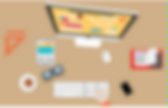

Practice Shared by Colleagues @sheffcol 16/17. How do you plan your lessons? Whenever I ask colleagues the question, ‘How do you plan your lessons?’
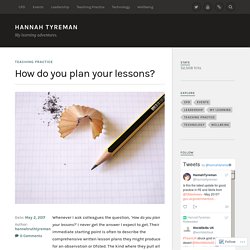
I never get the answer I expect to get. Their immediate starting point is often to describe the comprehensive written lesson plans they might produce for an observation or Ofsted. The kind where they pull all the stops out, justify their every move and add the cherry on top. A dancing, singing figure prances across my vision before I respond, ‘No, I don’t care about that kind of ‘planning’. ‘I’m interested in how you plan your lessons week in, week out – the planning you do for your students, not the big O.’ VIDEO - Doug Lemov - Entry Routine. READING - Doug Lemov- Systems and Routines Archives. READING - Marzano - Clear Learning Goals.
Create the right kind of learning goal for the right kind of knowledge The Power of Dr.
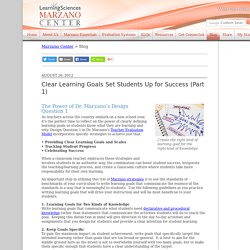
Marzano’s Design Question 1 As teachers across the country embark on a new school year, it’s the perfect time to reflect on the power of clearly defining learning goals so students know what they are learning and why. Design Question 1 in Dr. READING - Maximising the Impact of Teaching Assistants. Teaching assistants (also known as TAs or classroom support assistants) are adults who support teachers in the classroom.
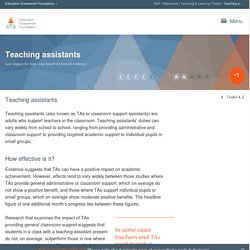
Teaching assistants’ duties can vary widely from school to school, ranging from providing administrative and classroom support to providing targeted academic support to individual pupils or small groups. How effective is it? Evidence suggests that TAs can have a positive impact on academic achievement. However, effects tend to vary widely between those studies where TAs provide general administrative or classroom support, which on average do not show a positive benefit, and those where TAs support individual pupils or small groups, which on average show moderate positive benefits. The headline figure of one additional month’s progress lies between these figures. The 7 habits of highly effective lesson plans – Peps Mccrea – Medium. Every year for the last six years, I’ve worked with over 50 teachers to help them become outstanding planners and teachers.
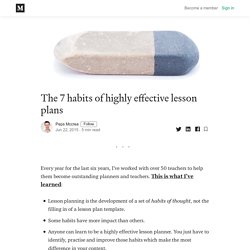
This is what I’ve learned: Lesson planning is the development of a set of habits of thought, not the filling in of a lesson plan template.Some habits have more impact than others.Anyone can learn to be a highly effective lesson planner. You just have to identify, practise and improve those habits which make the most difference in your context. So the big question is: which ‘habits of thought’ have the greatest impact? Cue the 7 habits of highly effective lesson plan(ner)s: This may sound obvious, but it’s not how all teachers start.
READING - Displays – The Sheffield College. Displays can be powerful tools to:
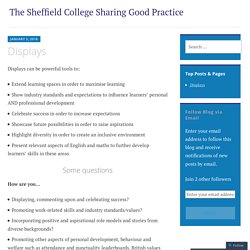
RESOURCES - Build Employability skills. CPD - Learning Objectives. A guide to making them effective What is the purpose of learning objectives?
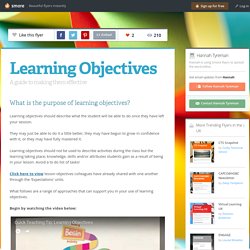
Learning objectives should describe what the student will be able to do once they have left your session. RESOURCES - Starters and Plenaries. Cornerstones of teaching - Using elearning technology to prepare you lessons. Cognitive Load Theory. It was around 18 months ago that I first came across Cognitive Load Theory (CLT) and shortly after, I blogged about its application in my practice.
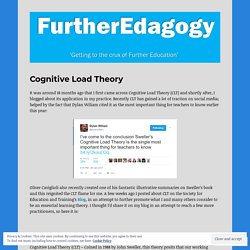
Recently CLT has gained a lot of traction on social media; helped by the fact that Dylan Wiliam cited it as the most important thing for teachers to know earlier this year: Oliver Caviglioli also recently created one of his fantastic illustrative summaries on Sweller’s book and this reignited the CLT flame for me. A few weeks ago I posted about CLT on the Society for Education and Training’s Blog, in an attempt to further promote what I and many others consider to be an essential learning theory. Using EdPuzzle to create quizzes in videos. Using Google Forms for tests. Moodle - Getting the basics right. 10 Tips for using G Suite. Plan for learning. – @mrocallaghan_edu. Image via @gapingvoid If learning happens when we are made to think hard.
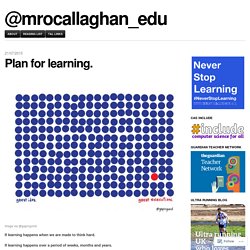
If learning happens over a period of weeks, months and years. Is lesson planing always carried out with student learning in mind? Recently I have led a series of talks/sessions/workshops on the challenges of leading teaching & learning across a school. What has struck me as somewhat odd is the number of people that hear the phrase ‘teaching & learning’ but only really register the ‘teaching’ part. Literacy booklets @FKRtson. STUDENT ACTIVITIES - DARTS Information booklet. STUDENT ACTIVITIES - English and maths starter activities. STUDENT ACTIVITIES - Embedding E&M. STUDENT ACTIVITY - How to plan your writing. STUDENT ACTIVITIES - 3 Strategies to Improve Student Writing Instantly.
Editor's Note: A version of this post first appeared on Techie Teacher and Character Coach.
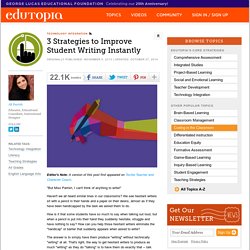
"But Miss Parrish, I can't think of anything to write! " Haven't we all heard similar lines in our classrooms? We see hesitant writers sit with a pencil in their hands and a paper on their desks, almost as if they have been handicapped by the task we asked them to do. How is it that some students have so much to say when talking out loud, but when a pencil is put into their hand they suddenly hesitate, struggle and have nothing to say? How can you help those hesitant writers eliminate the "handicap" or barrier that suddenly appears when asked to write? The answer is to simply have them produce "writing" without technically "writing" at all. Strategies That Work 1. Have your student stand up while you sit in his or her seat. 2. Identify a way that your students can audio record themselves "speaking" their essay rather than "writing" it. 3. Communication Before Craft.
RESOURCES - English. RESOURCE - Countdown Conundrum. READING - Teaching vocabulary – a whole school approach. In my last post, I queried whether schools should focus their vocabulary programmes on teaching tier two words, or if they would be better served directing their limited resources on improving the teaching of tier one words, particularly in the first instance.
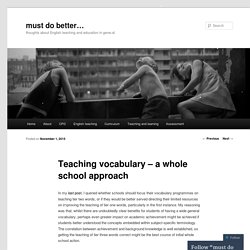
My reasoning was that, whilst there are undoubtedly clear benefits for students of having a wide general vocabulary, perhaps even greater impact on academic achievement might be achieved if students better understood the concepts embedded within subject-specific terminology. The correlation between achievement and background knowledge is well established, so getting the teaching of tier three words correct might be the best course of initial whole school action. In Building Background Knowledge for Academic Achievement, Robert Marzano offers a six-step guide to the teaching of academic background knowledge through vocabulary instruction. At the heart of our approach is the vocabulary journal. The words were: The future Like this: READING - Embedding English: Using your glossary more effectively to develop vocabulary skills. Many teachers I meet are using glossaries as a repository for key vocabulary on their courses.
It can be helpful to make explicit links between the language in the glossary and your delivery during the course and here are some quick activities to do this: In class, focus on the most difficult words from the glossary – the ones that are jargon, culturally loaded or conceptually complex – and try to explain, exemplify and check them with your groupChoose 7/8 words from the relevant unit in the glossary and get students to test each other – one student explains the word and gives an example and the other checks in the glossary/dictionary.
This works well as a revision exercise at the end of a unitMatch up exercises – students match the word to the definition on a card. Try to use the curriculum context in the definition. READING - Active Listening. Active listening is a skill that can be acquired and developed with practice. However, active listening can be difficult to master and will, therefore, take time and patience to develop. 'Active listening' means, as its name suggests, actively listening. That is fully concentrating on what is being said rather than just passively ‘hearing’ the message of the speaker. READING - Helping Students Believe That They can Write. I am an extremely fortunate teacher. My classes are filled to the brim with bright, capable and hard-working students. I am constantly impressed by the arguments they construct in essays and the points that they raise in class discussions.
Although it might sound cliche, I can honestly say that I am proud of every single one of my students. Sadly, I am regularly told by some of my students that they do not have the ability to succeed in my class. When I ask them to explain why they think this might be the case, I am usually told that it is because they do not know how to communicate their knowledge. Discuss the Question I recently read an article by Christopher Reddy (2015) on the curse of knowledge. VIDEO - Develop your learners' speaking and listening skills. RESOURCES - Free Maths and Numeracy resources. RESOURCES - Maths starters, activities and games. RESOURCES - A Shed full of Maths. RESOURCE - Maths Everywhere. WEBSITE - A Website For Students Who Think They Hate Maths.
The best resource for a student that thinks they hate math is a great teacher. But what about the best resource for that teacher? Beyond an active imagination, ability to relate to students, and an incredibly strong content knowledge themselves, it may not get much better than Numberphile . While the site is simple a crudely interactive graphic with links to videos, it has, in one fell swoop, creatively curated some of the most compelling and engaging “problems” in mathematics. From Benford’s Law to French Numbers, to whether or not zero is an even number, it frames the content area of math–which is often riddled with rote practice of very traditional arithmetic and formulas–in a problem-based learning kind of approach. Fantastic resource for bell ringers, test questions, math project-based learning ideas, or as a model for students to curate their own curiosities about the incredible–and poorly marketed–world of mathematics.
RESOURCE - Maths Calendars. Once again, a few of my favorite bloggers have come through with math calendars for our students to puzzle over. Check them out: Things to Do with a Math Calendar At home: Post the calendar on your refrigerator. Use each math puzzle as a daily review “mini-quiz” for your children (or yourself). In the classroom: Post today’s calculation on the board as a warm-up puzzle. RESOURCE - Countdown Numbers Game. RESOURCES - TED-ED- Mathematics Lessons. RESOURCES - Revision - Access Maths. RESOURCE - Online maths activities.
RESOURCE - Sports related maths questions. RESOURCES - Maths worksheets to engage learners following a sports-related vocation. WEBSITE - Upworthy: Things that matter. READING - 20 Tips for Creating a Safe Learning Environment. I visit a lot of classrooms. And I'm always fascinated by the variety of ways teachers launch the new school year and also with how they "run their rooms" on a daily basis. From these visits and my own experiences as an instructor, I'd like to offer my top 20 suggestions for keeping your classroom a safe, open, and inviting place to learn. 1. Community Build All Year Long. Routinely include strategies and activities in your lessons, such as Save the Last Word for Me, that allow students to express their thoughts and ideas, build relationships, and practice collaboration. 2. READING - Teaching and Trust. (Nomads II, by Pablo Jurado Ruiz)
READING/VIDEO - What are women? I just finished reading the book, The Good Earth, and of course, I had many questions regarding it and its contents. WEBSITE - Prevent for Further Education and Training. READING - Which British values are most important? READING - A powerful poem about race and gender. Remember when you were a child and it felt like everyone — parents, teachers, adults in general — tried to speak for you? It was probably really frustrating. READING - Taking the courage to go beyond equality and diversity.
Guest post by Kay Sidebottom, Teacher Educator. WEBSITE - Safeguarding women and girls from violence. READING - Digital Footprint. WEBSITE - E-Safety- Thinkuknow. WEBSITE - UK Safer Internet Centre. READING - Independent Thinking - Blog. The following model is the one we use as the cornerstone to underpin relational practice. It is based on a model originally created by Malcolm Glaser, but more recently promoted by Ted Wachtel and Paul McCold. It’s called the Social Discipline Window and it's the basis for a restorative practice model built on high challenge and high support. (Actually, the original version uses the word ‘control’, but I replace it with the word ‘challenge’ in the work I do for reasons that will become clear.)
High challenge, high support is one of the ‘four ways of being’ but it is the one that pays dividends when it comes to getting the best out of young people. In a nutshell, these fours ways are: DISCUSSION - Learning Support in Further Education - BCU PCET. READING - Autism and education: key points and resources. When providing the best provision for pupils with autism there are many aspects and people to consider. Gareth D Morewood collates why we know what we know. I have written quite a lot about autism and education, indeed it is possibly the area I have most involvement with as a SENCo, researcher and supporter of families and young people. READING - 10 tips to maximise learning support. VIDEO - Shedding Light on Learning Disabilities. VIDEO - Technology Tools to Support Learning. VIDEO - What's It Like Being Dyslexic?
VIDEO - What is dyslexia? READING - An army of support staff is ready to go into action. LINKS - Special Needs Teaching Ideas. READING - 'Teachers must not assume that SEND always means challenging behaviour,' says the head of a special school.